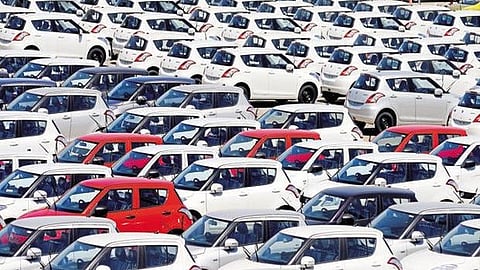

MUMBAI: India's auto industry is racing against time to secure rare earth materials, including magnets, as many players risk exhausting their existing inventory in less than a month.
Two industry executives told the TNIE that they are in constant discussions with suppliers, who are awaiting China's approval to resume rare earth material exports to India. So far, there has been no breakthrough.
With uncertainty over Chinese permits, automakers are also exploring alternative sources from non-Chinese suppliers to mitigate potential supply disruptions.
“If our existing supply keeps on depleting, its initial impact will be seen in the production of our electric vehicles. We have informed the government about this,” said a senior executive of a passenger vehicle company. CEO of an electric two-wheeler company said that most auto players will start cutting down production from mid-July if they are not successful in securing the magnets. “Most players are desperately reaching out to non-Chinese players and are willing to pay a premium price for the magnets,” the CEO stated.
Ratings agency Crisil said on Tuesday that rare earth magnets could emerge as a key supply-side risk for India’s automotive sector if China’s export restrictions and delays in shipment clearances persist. A disruption lasting beyond a month can impact electric vehicle (EV) launches, affect production and weigh on the sector’s growth momentum, it added.
Poonam Upadhyay, Director, Crisil Ratings said that automakers are actively engaging with alternative suppliers in countries such as Vietnam, Indonesia, Japan, Australia, and the US, while also optimising existing inventories. “With applications across EVs and ICE vehicles, a prolonged supply squeeze could disrupt production of PVs and 2Ws, making this low-cost component a potential high-impact bottleneck for the sector,” stated Upadhyay.
According to a Reuters report, Maruti Suzuki plans to cut down production of its debut electric vehicle, the e-Vitara, to 8,221 units between April and September 2025 from the original target of 26,512 units.
A Mahindra & Mahindra spokesperson said that that they currently have inventory for affected parts to meet the production needs. “We are actively de-risking our supply chain by sourcing assembled parts, exploring alternate materials, and working with SIAM and the Government of India to expedite certifications,” stated the spokesperson.
Commerce and Industry Minister Piyush Goyal said on Monday that China's restrictions on the export of rare earth elements and related magnets would affect the domestic auto and white goods sectors in the short term but the government and the industry are working actively on solutions.
In April 2025, China – the world’s dominant exporter of rare earth magnets – imposed export restrictions on seven rare earth elements and finished magnets, mandating export licences. The revised framework demands detailed end-use disclosures and client declarations, including confirmation that the products will not be used in defence or re-exported to the US.
With the clearance process taking at least 45 days, this added scrutiny has significantly delayed approvals. And the growing backlog has further slowed clearances, tightening global supply chains, stated Crisil. India, which sourced over 80% of its 540 tonne magnet imports from China last fiscal, has started to feel the impact.
Rare earth magnets are integral to permanent magnet synchronous motors (PMSMs) used in EVs for their high torque, energy efficiency and compact size. Hybrids also depend on them for efficient propulsion. In internal combustion engine (ICE) vehicles, the use of rare earth magnets is largely limited to electric power steering and other motorised systems.